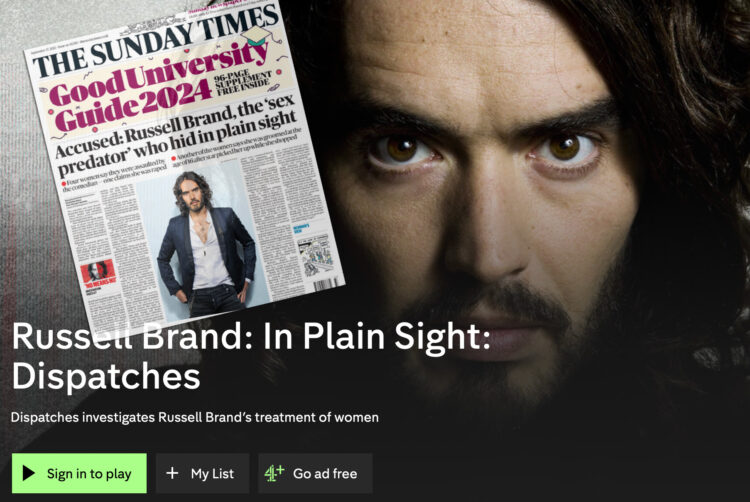Opinion
The Russell Brand allegations remind us why scale in media matters. Without being part of the so-called ‘mainstream media’, how else can journalists hold the rich, famous and powerful to account?
In my August The Media Leader column I railed against the hysteria that surrounded the recent-ish media hyping of the Phillip Schofield and Huw Edwards stories and how they are part of a nonsensical ‘culture war’ that some of us (yes, including me) feed off daily but which matters little in the real world.
One month later, we have plunged deeper into the morass.
Yes, this is about Russell Brand and I apologise for throwing yet another log on what is already a raging fire, while knowing that I am in danger of being branded (see what I did there?) a hypocrite for doing so.
But this episode is bigger than anything that has gone before, at least in the UK, so we have to talk about its consequences for our media industry.
Mistaking ‘trial by media’ for ‘investigative journalism’
You will all by now know more than you wanted to about Russell Brand. Until last week I was of course aware of him but I don’t recall ever seeing him in action. I was aware of ‘Sachsgate’ but otherwise had no opinion beyond a vague sense that Brand has reinvented himself as a champion of free speech on the internet, with stream-of-consciousness diatribes about the vaccines and so on. I was indifferent.
The first I knew about the volcano that was about to erupt was clips from Brand himself pre-empting the story on his channels, swiftly followed by others defending him before the allegations even appeared.
Then I read the Sunday Times/Times story and watched Dispatches on Channel 4. It would be hard to conclude that there is no case to answer after an exhaustive investigation, legal scrutiny and risk assessment by the publishers and broadcasters.
Channel 4 is regulated by Ofcom and The Sunday Times has decades of successful investigative journalism to protect, not to mention the avoidance of libel.
Needless to say, Brand’s fellow self-declared ‘champions of free speech’ leapt to his defence, concluding of course that this is an ‘establishment’ take-down of someone who is challenging the normal narrative. Elon Musk chimed in with the perhaps ill-considered view that this was a co-ordinated action to remove a competitor.
Allison Pearson of The Telegraph opined that it is a measure of our cynicism that we automatically assume that there is a hidden agenda behind these accusations, to which the only sensible response is to question the use of the word “our”.
Perhaps the most entertaining theory was that the story was timed to distract from the imposition of a blanket 20mph speed limit in Wales (no, this wasn’t a parody).
Someone on LinkedIn seemed to think that the Brand story is designed to distract us from the fact that noone has been arraigned for being part of Jeffrey Epstein’s coterie of fellow child traffickers. I can’t imagine that these people (usually ‘they’) would want to use a story about sexual exploitation as a smokescreen for, er, sexual exploitation.
The greatest entertainment was provided by GB News’ presenters arguing on-screen about this issue, a candidate for comedy moment of the year (inadvertent category), followed by further hilarity as the spat spilled over onto Twitter over the following days.
The outcry from the usual suspects was entirely predictable but more surprising was the much-touted ‘trial by media’ trope that has taken hold and come from some surprising places.
Gordon Young, writing in The Drum, expressed concerns that this ‘trial by media’ was prejudicing normal legal processes, a view shared elsewhere.
So when did investigative journalism become ‘trial by media’?
A reminder of why we need a ‘mainstream’
The exploits of Harvey Weinstein were first revealed in all their horrible detail by The New York Times and The New Yorker.
Epstein was eventually convicted (for the second time) after the Miami Herald pursued his story. The BBC blew the whistle on Jimmy Savile, but only after his death.
In fact, The BBC’s Panorama programme has been exposing wrongdoing for decades, much of it criminal. Its recent report on Thurrock Council was especially shocking.
The red tops have also been exposing wrong-doing for decades. The News of the World did little else before committing hara kiri through its own misdemeanours.
The Financial Times has recently extensively covered the poor personal behaviour of Crispin Odey.
And so on through time. The media have always purported to hold public figures to account and this has often led to criminal proceedings.
We have to commend Channel 4 for its ‘Dispatches’ edition on Brand. Some of his alleged exploits (whether criminal or not) were facilitated by his appearances on shows commissioned by Channel 4, as well as the BBC and other broadcasters.
The spectacle of a programme on Channel 4 asking Channel 4 to comment may appear surreal, but is in fact a sign of health. Ditto the BBC reporting on Huw Edwards and asking the BBC for a statement.
We should be grateful that these so-called ‘mainstream media’ (MSM) vehicles gave a voice to the victims of Weinstein and Epstein. We should be pleased that the reporters for the Sunday Times and Dispatches have enabled the people who have allegedly suffered at the hands of a sexual predator to have their stories heard. We should be glad that investigative journalism, properly researched and cleared by legal scrutiny, brings allegations of wrong-doing (and not just criminality) to the surface.
This isn’t political. It’s moral
It is good that broadcasters are regulated to prevent them from disseminating false information and that legal processes censure them if they do.
None of this applies to the internet ‘free speech’ brigade who are free to dispense their opinions liberally having ‘done their research’ (or not) which normally means watching YouTube videos by other ‘free speech’ champions.
Those who suffer from the depredations of people in powerful positions are often fearful, ashamed and subject to online pile-ons and even death threats from the defenders of the alleged perpetrators. Someone has to represent them and it is only the so-called ‘mainstream media’ who can do this, using the scale of their platforms to bring these matters to the public’s attention.
Sometimes this debate is characterised as ‘right versus left’, or some such. It’s not a political matter and it’s not part of the so-called ‘culture wars’. It’s about morals and right and wrong behaviour, and people who leap to the defence of alleged perpetrators should take a step back and ask themselves why they condone bad behaviour that has nothing to do with politics or culture.
This isn’t about taking sides.
The ’MSM’ are often the first people to bring wrong-doing to light, and the judicial process can and should follow if criminality is alleged.
And scale matters. The recent allegations of exploitation by Dan Wootton while at The Sun and the Daily Mail were made through Byline Times. This publication does not seem to have the penetration to produce an equivalent backlash that can be produced by bigger titles such as The Sun.
Does such blanket coverage potentially prejudice a fair trial if it comes to that? Well, that’s what strong institutions are for and we should also be pleased that the UK has a good track record of dispensing justice correctly.
It’s not easy being a ‘mainstream’ medium in the age of unbridled opinion-mongering and mass conspiracy theorising. But we should encourage our broadcasters and publishers in their attempts to hold the powerful to account and act as an outlet for the people who suffer at the hands of those who exploit their fame or power for personal gain or gratification.






 Nick Manning is the co-founder of Manning Gottlieb Media (now MGOMD) and was CSO at Ebiquity for over a decade. He now owns a mentoring business, Encyclomedia, offering strategic advice to companies in the media and advertising industry, and is non-executive chair of Media Marketing Compliance. He writes for The Media Leader each month.
Nick Manning is the co-founder of Manning Gottlieb Media (now MGOMD) and was CSO at Ebiquity for over a decade. He now owns a mentoring business, Encyclomedia, offering strategic advice to companies in the media and advertising industry, and is non-executive chair of Media Marketing Compliance. He writes for The Media Leader each month.